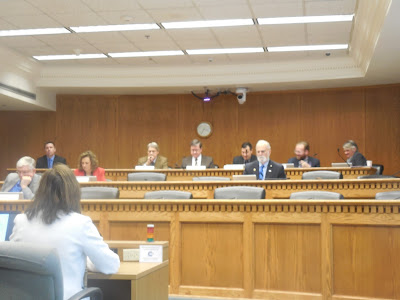On February 14th, the Washington State House of Representative's Business and Financial Services Committee held a hearing on House Bill 1804. This bill was sponsored by two Democrat legislators who both were Chairs of Committees. The prime sponsor was Rep. Steve Kirby from the 29th District (chair of the committee holding the hearing), and Rep. Timm Ormsby of the 3rd Dist (Chair of the House Appropriations Committee). This bill was dropped due to the refusal of fellow Democrat, and fellow Committee Chair Rep. Judy Clibborn of the 41st Dist. to even hold a hearing on a motorcycle helmet bill in her career as Chair of the House Transportation Committee.
In Hearing Room B of the John L. O'Brien building at the state capitol campus, the bill was heard before the committee. The audience was filled with interested parties for what turned out to be the first motorcycle helmet law amendment bill hearing held in the House since at least the late 1970's. The bill would permit motorcyclists the opportunity to choose whether or not to wear a helmet, provided they possessed proof of insurance that met Washington State's Financial Responsibility Law. Several motorcyclists gave testimony to the facts that this was a "freedom of choice" issue. As well as there being adverse physical effects for some riders forced to wear helmets. Studies by the National Highway Traffic Safety Administration, and the Governor's Highway Safety Association were cited that showed; risks of severe injuries to helmeted motorcyclists significantly above those for non-helmeted motorcyclists, and also that of the 16 states in 2015 that showed a reduction in motorcycle fatalities only six were helmet law states. Testimony was also given on the very high rates of motorcyclists who insure their motorcycles at levels that exceed the state's minimum requirements.
In opposition, the Washington State Patrol testified that removing the helmet law would result in an increase of serious crashes on the highways. (Which seems illogical on its face since the wearing of a motorcycle helmets has virtually no causal effect on crashes.) This supposed increase in crashes would lead to more hours spent by the WSP and other law enforcement investigating crashes, and additional traffic congestion due to these crashes. If the WSP is to be understood correctly it seems that motorcycle helmets have some ephemeral ability to reduce crashes causing traffic congestion, and lower the overtime for law enforcement investigating those crashes. Surely, that can't be right?
On the 15th of February, the committee held executive session on 1804, and in a 7-4 bi-partisan show of support, voted to pass the bill out of committee, and on to the House Rules Committee. Again, this was an historic event, as it marked the first time since at least the late 1970's that a motorcycle helmet law amendment bill was passed out of a House Committee. The fact was not lost of the Chair, who in the excitement after the vote, almost adjourned the hearing with one more bill on the agenda. After that bill was also given a "do pass" vote, Chairman Kirby adjourned the hearing, after he commented on his error as shown in the clip below.
Catch you on the road sometime...





